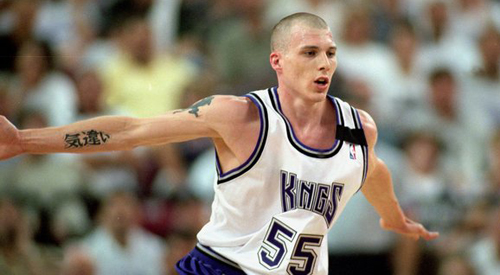
The Jason Williams Effect
Say what you want about adolescence, at least it’s memorable. At least the idols and icons you admired back then, during the unnerving transition years of youth, still hold a significant place in your heart today.
I’m not necessarily saying that our heroes of yesterday remain the people we look up to in adulthood – in fact, it’s likely just the opposite – but rather that the impact they had during those malleable teenage years never quite fades away.
Such is my relationship with Jason Williams.
There were worse role models for a 13-year-old white boy to look up to in the late 1990s than Jason Williams (though youth basketball coaches preaching fundamentals at the time likely disagreed).
But there certainly were better.
Looking back with over a decade’s worth of hindsight separating the lives we lead now and the ones we led back then, while the flaxen-haired rookie made his arrival in Sacramento, it’s easy to cast aside the stereotype. There was an intrinsically trashy, foul-mouthed stigma that followed Williams wherever he went.
That he fueled such a fire with marijuana allegations, the infamous “whit eboy” tattoo and a shaved head only added to his caricature, confirming suburbia’s deepest fears with every highlight reel and magazine cover.
[php snippet=1]
Jason Williams wasn’t alone, his timeline exists in an eery parallel with that of a man he’s too easily confused with, a man who bears not only a virtually identical physical resemblance, but also in spirit: a rapper named Marshall Mathers.
Williams and Eminem were both heroically confident, caucasian young men with egos often bordering on brash. Both were unfathomably talented in their respective arts with skill sets unprecedented for typical individuals of their race.
What set Williams and Mathers apart from the rest of their peers, wasn’t only that they existed out of place, but that they thrived there. Their ability to blend in talent-wise in their own predominantly-African American scenes so utterly flawless that it made more sense to question their pigmentation than whether or not they genuinely belonged.
Had Williams not immediately arrived on the scene as the flashiest point guard in the NBA, or had Mathers not shown an unparalleled ability to write lyrics, neither would be revered even remotely near the levels they are today. But they were.
Looking back, it seems to make sense that it would require men of such transcendental cultural power to bridge the gap between stereotypes, individuals whose presence in a scene mirrored or even exceeded the size of the scene itself.
Although Jason Williams didn’t reinvent basketball and Eminem didn’t reinvent hip hop, the pair did manage to break down cultural walls that had long been established by a society that assumed particular races behaved only in particular ways.
Neither Williams nor Mathers’ accomplishments match the significance of the countless stereotype-bending individuals who came before them, but they exist nonetheless as modern day examples of society’s never-ending quest for unwavering equality.
As an admittedly spoiled member of a pampered generation – especially as young, impressionable suburban teenager – perhaps it was Jason Williams’ insistence on trick passing his way into a club to which he never previously belonged that made him such a compelling – albeit ultimately insignificant – figure in my life.
Then again, as an adolescent, I also had a Tom Green poster above my bed.
[php snippet=1]

